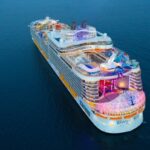Royal Caribbean Group Reports Annual Sustainability Progress Towards Nett Zero
Contributors are not employed, compensated or governed by TDM, opinions and statements are from the contributor directly
 Royal Caribbean Group has released its annual Sustainability Report, outlining significant milestones the company has reached in its mission to responsibly deliver the best vacation experiences. Driven by its SEA the Future initiative, the company has advanced its commitment to sustain the planet, energise communities, and accelerate innovation.
In 2023, Royal Caribbean Group made significant progress towards its net zero vision. It achieved over half of the company’s carbon intensity reduction target, completed successful biofuel trials across Europe, and introduced the maritime industry’s first waste-to-energy system onboard a ship.
Jason Liberty, President and CEO of Royal Caribbean Group said, “I am proud to share the encouraging results from our SEA the Future efforts in our annual Sustainability Report and our first Community Impact Report, which underscore the strength of our commitment to the environment, the communities we visit, and our people.”
The publication of its first Community Impact Report dives into the breadth of work Royal Caribbean Group completed in 2023 to engage communities, celebrate its culture, and promote economic resiliency in the destinations they visit.
Highlights from the reports include:
Sustaining the Planet
Royal Caribbean Group has released its annual Sustainability Report, outlining significant milestones the company has reached in its mission to responsibly deliver the best vacation experiences. Driven by its SEA the Future initiative, the company has advanced its commitment to sustain the planet, energise communities, and accelerate innovation.
In 2023, Royal Caribbean Group made significant progress towards its net zero vision. It achieved over half of the company’s carbon intensity reduction target, completed successful biofuel trials across Europe, and introduced the maritime industry’s first waste-to-energy system onboard a ship.
Jason Liberty, President and CEO of Royal Caribbean Group said, “I am proud to share the encouraging results from our SEA the Future efforts in our annual Sustainability Report and our first Community Impact Report, which underscore the strength of our commitment to the environment, the communities we visit, and our people.”
The publication of its first Community Impact Report dives into the breadth of work Royal Caribbean Group completed in 2023 to engage communities, celebrate its culture, and promote economic resiliency in the destinations they visit.
Highlights from the reports include:
Sustaining the Planet
- It achieved a 6.8% reduction in carbon intensity, reaching more than half of its double-digit carbon intensity reduction target.
- Expanded its energy portfolio following successful biofuel trials, which confirmed that “drop-in” percentages of the alternative fuel can be used without needing to modify engines or impact onboard technical systems.
- Increased local sourcing globally, reducing miles travelled by 37% — supporting not only the communities it visits but also reducing its Scope 3 emissions in certain regions.
- Helped protect marine species through Shellbank, an innovative genetic technology program that matches DNA for critically endangered sea turtles to known locations to determine priority conservation sites and prevent illegal harvesting.
- Launched Royal Caribbean International’s Artist Discovery Program, prominently showcasing up-and-coming local Caribbean artists on board the company’s newest ship, Icon of the Seas.
- Designed unique training for Bahamian entrepreneurs participating in the Small Business Development Centre’s (SBDC) Royal Caribbean Kickstarter Programme, which was created to empower local tourism-related businesses.
- Introduced the first accessible Star Class suite on Royal Caribbean International’s Icon of the Seas.
- Introduced the first at-sea waste-to-energy systems, which debuted on Silver Nova and Icon of the Seas.
- Began construction on the first tri-fuel methanol-capable ship, Celebrity Xcel.
- We have renewed our partnership with the University of Miami’s OceanScope and committed additional funds. This partnership builds on two decades of ocean conservation and research aboard Royal Caribbean Group ships.

